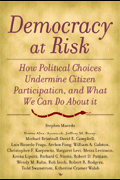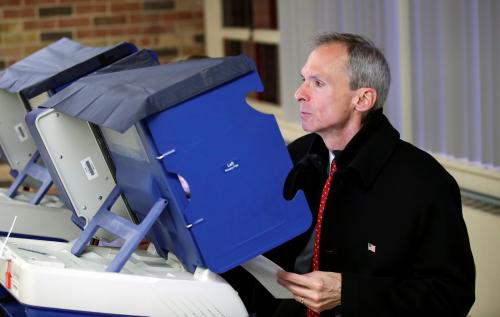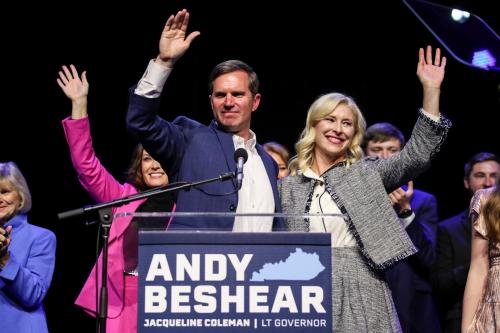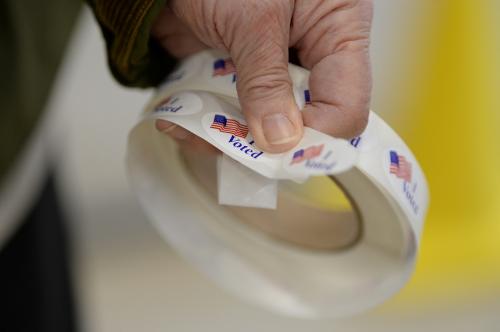If the 2018 election were held tomorrow, the Democrats would win it handily. The fight over the confirmation of Brett Kavanaugh is making matters worse for the GOP. But the biggest problem Republicans face isn’t Kavanaugh, or their unpopular stance on key issues; it’s President Trump. These are some key findings from a just-released Pew Research Center survey.
Among registered voters, Democrats enjoy a 10-point lead (52-42) in the generic ballot for the House of Representatives. This is bad news for Republicans, because a 10-point margin on election day would give Democrats control of the House with room to spare.
Adding to the bad news, Democrats continue to hold the edge in voter motivation. Sixty-seven percent of Democratic supporters—the largest share in recent history—say that they are more enthusiastic than usual about voting. At this point in 2010, 42 percent of Democrats felt this way; in 2014, just 36 percent.
Moreover, the dynamics of this election cycle are different. Between June and September of this year, overall voter enthusiasm rose by 10 percentage points. Between June and September of 2014, by contrast, it didn’t budge. Nor did it do so in 2010.
The evidence suggests that this gain has been driven by rising interest among Democrats. As recently as June, for example, equal shares of Democrats and Republicans reported that they were following news about the election “very closely.” Now, Democrats have moved out to a 6-point lead in this measure of voter attentiveness.
The Supreme Court has soared to the top of voter concerns, edging out health care and the economy. Republicans—especially social conservatives—have long cared more than Democrats about court appointments. Now, for the first time I can remember, this has been reversed. A remarkable 81 percent of Democrats say that court appointments will be “very important” to their vote, compared to 72 percent of Republicans. During the 2016 presidential contest, by contrast, only 62 percent of Democrats regarded the Supreme Court as very important.
Despite Tip O’Neill’s famous maxim that all politics is local, the 2018 election has been nationalized around the figure of Donald Trump and the issue of party control of Congress. Just 37 percent of registered voters—the lowest level ever recorded—say that the president will not be a factor in their vote. Among the 60 percent who say that it does matter, 37 percent will be casting their vote against President Trump, compared to just 23 percent who will be doing so to support him.
In another indication of a nationalized election, 72 percent of the electorate—the highest level in at least two decades—say that which party controls Congress will be a factor in their votes. Seventy-seven percent of Democrats indicate that partisan control matters, as do seventy-three percent of Republicans, who enjoyed an edge in this measure in the run-up to the midterms elections of 2010 and 2014. The last time Democrats had the advantage was in 2006, an election that enabled them to regain control of the House.
No doubt President Trump will campaign hard in the next six weeks to avert a Republican defeat. The structure of public sentiment will not make his job any easier. His signature issues—trade, immigration, and terrorism—are well down the list of voters’ concerns, as are tax cuts, the Republicans’ longtime calling card. On health care, a top-tier issue, Democrats hold a 16-point edge. Despite the recent strength of the economy, Republicans can manage no better than a tie. Overall, 53 percent have a favorable view of the Democratic Party, compared to 43 percent for Republicans.
It’s still September, leaving plenty of time for the fabled “October surprise.” But unless something big happens to change the underlying dynamic of the 2018 election, President Trump will be facing a divided government next year. This would change his presidency—and perhaps his life—in ways that one suspects he has not begun to imagine.
The Brookings Institution is committed to quality, independence, and impact.
We are supported by a diverse array of funders. In line with our values and policies, each Brookings publication represents the sole views of its author(s).











Commentary
Polling Spotlight: Republicans can thank Trump for highly motivated Democratic voters
September 26, 2018